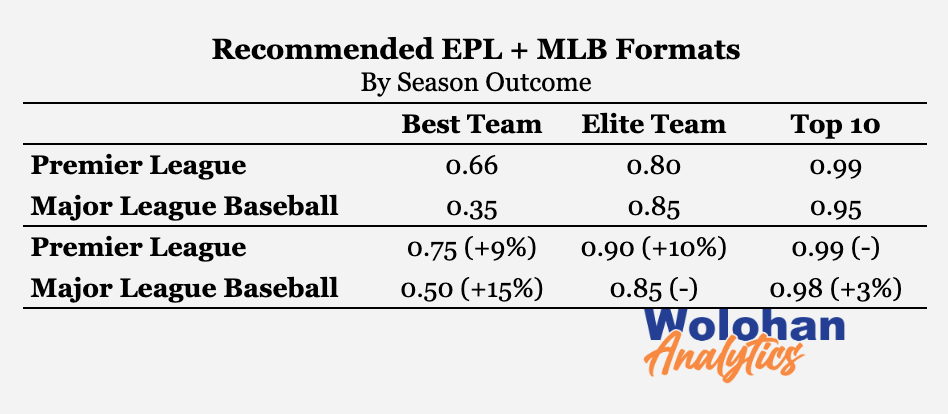Baseball and Soccer Should Switch Formats
How the fundamentals of baseball and soccer differ, and how each league can learn from the other.
We don’t cover baseball very much here at Wolohan Analytics. And there’s a reason for that: baseball isn’t a very well put together sport.
Baseball games are fun. They’re enjoyable to go to and enjoyable to watch on TV. The athletes are talented. Home runs, diving catches and strikeouts are exciting.
What baseball gets wrong is that it does a terrible job of deciding a winner. After 162 games and then multiple rounds of playoffs, the World Series champion, more likely than not, is not the best team. And that’s a shame.
Looking back on last season, does anyone feel good about the claim that the 90-win Texas Rangers were better than all three of the 100-win Orioles, Braves, or Dodgers?
The English Premiere League has a different problem: their league ends with a whimper. After a long season, jostling up and down the table, the teams in contention end their seasons against hapless foes, who are lucky to draw.
Last season, for example, Arsenal and Man City were neck and neck down the stretch. But instead of playing competitive matches, they both frequented bottom of the table teams, like Bournemouth and Nottingham Forest.
Both sports problems, however, are solvable, if only they’d take a page out of one another’s playbooks.
If you’re enjoying Wolohan Analytics, consider sharing the newsletter with others who might enjoy it. We appreciate it.
Information in Baseball and Soccer Games
Baseball and Soccer are different sports. Obvious enough. The difference that is relevant here is the amount of information contained in any individual game.
In soccer—like basketball—games contain a lot of information. We can be confident that the winner of a soccer game was better than the loser of the soccer game. If you want to win the Premiere League, you can only afford to lose 3 to 5 of your 38 games. That’s a winning percentage of around 80%, after we start factoring in draws.
In baseball, the amount of information per game is low. An excellent season, might end with a team winning 65% of their games and 105 wins. That’s 15% worse than their EPL counterpart.
Current Method of Crowning Champions
Which brings us to the current method each sport has for crowning champions.
In Major League Baseball, each team plays a 162 game season—a combination of frequent division play, regular within-league play, and infrequent interleague play. Then, the top six teams—three division winners and three wild cards—play off in series of increasing length.
In the EPL, the structure is more simpler. Each teams plays every other twice, earning three points for a win and one for a draw. The team with the most points at the end of the season is the champion. Additionally, simultaneous to the season, is a season-long tournament: the FA Cup. Every team in the Premiere League (among others), gets to compete in this tournament.
To measure the properties of these formats, we ran 100,000 simulations of each format, using team strength estimates from FiveThirtyEight’s MLB Elo ratings and ClubElo’s English club-strength ratings. As it currently sits, baseball’s format crowns the best team as champion only 35% of the time, and the EPL’s format crowns the best team only 66% of the time.
Meanwhile, both formats do an okay job of crowning a competitive team. About 4-in-5 winners can be considered an “elite” team across formats. Here, we define elite as within 5% points of beating the best-team in the league heads up. or no worse than +120 on the Moneyline for a single game.
And both formats do an excellent job of crowning winners from the top 10 teams in the league. We’ve seen this happen recently in the EPL. in 2016, Leicester City shocked the world, winning the EPL just two years after being promoted from the Championship league.
Of those numbers, the one that concerns me the most—and one of the reasons why we don’t cover a lot of baseball—is baseball’s mere 35% crowning the best team as their champion. This means that more often than not, we expect baseball to name a World Series winner who is not the best team in the league.
It makes it hard to get invested in a sport when you know the outcome is not telling you what you want to know.
If you’re enjoying Wolohan Analytics, consider sharing the newsletter with others who might enjoy it. We appreciate it.
Taking a page from each other’s playbooks.
To improve the situation, what if baseball was a bit more like soccer and soccer was a bit more like baseball?
The Baseball Proposal
For baseball, we’re proposing they adopt a 160-game regular season, split into three parts:
88 games of Division Play
36 games of Qualifying Play
36 games of Championship Play
In the the first 88 games, each team would play:
12 games against division opponents
4 games against every team from another division
4 games against a mix of rivals and randomly drawn teams
Following the Division stage, the league would be split into thirds, by standing: a top third, a middle third, and a bottom third. Each team would then play 4 games against the other 9 teams in their third. This would constitute Qualifying Play.
After Qualifying Play, a promotion and relegation cycle would take place, based on team records during the Qualifying Play stage. The top third would drop its worst two teams into the middle third. The best teams from the middle and bottom third would advance to the top third. And the worst team from the middle third would drop to the bottom third.
Then, the teams would play 36-games of Championship Play, with each team playing 4 games against each of the 9 teams in their third. The team in the top third with the best record during Championship Play would win the league.
This has three effects:
The team that wins the league is more likely to be the best team.
The final games played are likely to be competitive and consequential.
The integrity and legacy of baseball’s divisional play is maintained.
For added flavor, like English soccer, Major League Baseball could add a tournament featuring all 30 teams in best-of-7 series, that go on throughout the season, and conclude immediately following, or shortly after, the regular season.
The Soccer Proposal
For English soccer, our proposal is simpler: add a six team playoff to the end of the season. Give the top two teams a bye round. And have a home-and-away knockout tournament, a la the Champions League.
This adds 10 new, exciting games to the schedule, and ensures that the season ends with a bang, not a whimper.
Proposals by the Numbers
But what do these proposals do by the numbers? Do they increase the likelihood of the best team winning? Indeed, both do, by substantial margins.
After 100,000 simulations, the proposed baseball format increases the likelihood of baseball’s winner being the best team by 15 percentage points—up to 50% from 35%. Meaning under the new format, the winner of the baseball title would actually have claim to being the best team. In the Premier League, the likelihood of the best team winning it all goes from a 2-in-3 chance to a 3-in-4 chance. A substantial, change—even if it’s not as critical as the leap in baseball.
The new format also improves the Premier League’s odds of crowning an elite team as their winner, which goes up by 10 percentage points. And under our proposed format, the MLB improves slightly in their ability to recognize a top-third of the league team: jumping up to 98% from 95%.
In practical terms, this would solve both of the problems we mentioned at the start:
Baseball would crown a meaningful champion
The Premier League would have exciting end of season matches
But is also raises an interesting question.
Why does switching formats work?
How is it that baseball’s format is better for soccer and soccer’s format is better for baseball? If the playoff works for soccer, shouldn’t it work for baseball too? Or vice versa: if crowning the season leader is a good fit for baseball, why shouldn’t it be a good fit for soccer?
Which gets at an underlying emphasis of this post: all sports are different. We need to keep that in mind when analyzing them. We cannot blindly take things from one sport and drop it into another, assuming it carries with it all of its meaning.
Most often, this comes when we borrow baseball concepts and bring them to other sports. Sometimes this works. Sometimes this is foolish. In this case, carrying baseball’s playoff system into soccer works well. But even then, baseball has more to gain by copying soccer’s league system.
If you’re enjoying Wolohan Analytics, consider sharing the newsletter with others who might enjoy it. We appreciate it.





